
by Dorothy C. Lee | Aug 4, 2020
The taste and fragrance of a cool, juicy slice of fresh melon in the summer just can’t be beat. Melons have been a favorite fruit for many centuries. They appear in Egyptian tomb paintings dated to 2400 B.C., and they are mentioned in the writings of the early Greeks and Romans. Mark Twain called watermelon “the food that angels eat.”
Uses & Preparation
Watermelon, honeydew, and cantaloupe are excellent cut up in salads, as a dessert, or alone as a cool, refreshing snack anytime. To save space and cooling time in the refrigerator, cut up the melon and cover tightly with plastic wrap.
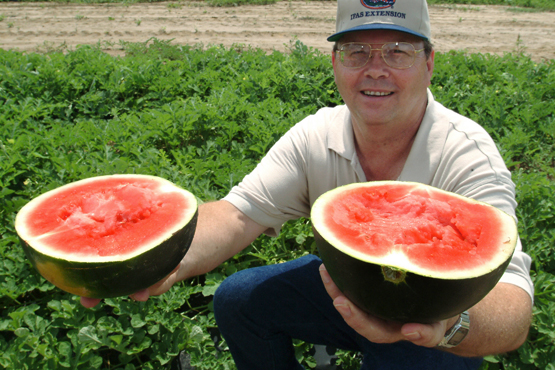
UF/IFAS Photo
Selection
Thumping watermelon to judge ripeness is not always accurate, because you can’t tell if it is ripe or overripe. Instead, look for a well-proportioned melon with full ends, a dull outer skin, and the bottom a yellowish color, or turning from white to pale green.
Cantaloupe should have no sign of a stem, be nicely rounded, and the netting should be evenly distributed. Golden-colored melons with a mild melon odor are the peak of ripeness, while green ones will ripen in a few days if kept at room temperature.
A ripe honeydew melon has a creamy yellow rind that is soft and velvety. The best – tasting honeydew smells slightly fruity. Hold a honeydew at room temperature for a few days for even tastier fruit.
Melon Salad
Arrange balls or slices of watermelon, cantaloupe, or honeydew melon, alone or in combination, on lettuce. Serve with French dressing. Diced apples, diced pears, nuts, and chopped celery may be added for variety.
Chicken & Watermelon Salad
5 chicken breast, boned, skinned, cooked and cubed
3 cups watermelon, cubed
3 cups pears, cored and cubed
1/2 pound sliced mushrooms
1/2 pint low-calorie Italian dressing
Combine all ingredients, toss gently. Refrigerate on hour, stirring occasionally. Serve on a bed of lettuce.
Nutrition Information
Low in sodium. Low in calories. Good source of vitamin A.
Available Fresh
June – August
To learn about fresh Florida melons, please read our fact sheet: Panhandle Produce Pointers – Melons
For more delicious produce preparation tips, please visit: http://www.panhandleproducepointers.com.

by Samantha Kennedy | Jul 16, 2020
An abundance of sunshine is one of the many reasons why so many people love Florida. In fact, it is why we are known as “The Sunshine State.” However, while the sunny days provide tons of opportunities to enjoy the great outdoors, too much sun exposure can lead to minor injury, serious illness, or even death.
The harsh UV rays from the sun can begin to damage the skin in as little as 15 minutes. In fact, even if the skin is not outwardly burned, it may be damaged underneath. Continued unprotected short-term exposure adds up over time, leading to more serious skin damage such as melanoma.
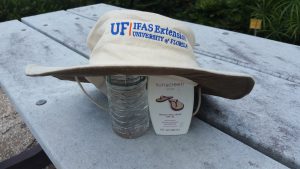
Sunscreen, ample water, and a good hat are all excellent precautions against problems with the summer sun. (Photo source: Samantha Kennedy)
Adopting a few sun safety practices greatly reduces the risk of serious skin damage. One simple practice is the daily application of sunscreen, even on cloudy days, as UV rays can penetrate cloud cover. A minimum Sun Protection Factor (SPF) of 15 is recommended for exposed skin, including lips. Do not use sunscreen past its expiration date, as it may not be as effective.
Eyes should be protected as well, as prolonged exposure to the sun can lead to vision loss or even blindness. Sunglasses which protect against both UVA and UVB rays offer the best protection. Wraparound sunglasses offer the most comprehensive protection of both the eyes and the tender skin surrounding them.
Cover other exposed skin as much as possible with dry, loose-fitting clothing whenever possible, on top of wearing sunscreen. Reapply sunscreen every two hours, especially during continuous sun exposure and after swimming, sweating, and toweling off.
Children under one year of age should be kept out of the sun as much as possible. Keep babies in the shade of a tree, umbrella, or stroller canopy at all times. Older children should follow the same precautions as those given above. Keep in mind, very young children cannot state it is too bright or too hot, so be extra vigilant.
Staying cool and hydrated is also important during those hot summer days. Even those who are acclimated to the climate can easily fall into the dangerous trap of dehydration and overheating. Paying attention to the body’s needs will help prevent heat stress and more serious heat-related illness.
The sun is at its hottest and most brutal between the hours of 10 a.m. and 4 p.m. Reducing outdoor activities between these hours can help reduce the risk of overheating. If this is impossible, be sure to take frequent breaks in a cool, shady spot to help maintain proper body temperature.
Lightweight, light-colored clothing reflects heat better than heavier, darker colors. Hats with wide brims going all the way around are ideal and offer more protection to the ears, neck, and scalp. Baseball caps are fine, but be sure to use a cloth in the back that drapes over exposed skin for more protection.
Drink plenty of fluids constantly. Plain water is the best choice to maintain proper hydration. Avoid alcohol, caffeine, and high amounts of sugar, as these can promote water loss, leading to dehydration. Find a shady spot or an air conditioned space to retreat to periodically throughout the day to keep from overheating.
Some symptoms of heat exhaustion include excessive sweating, confusion, dizziness, weakness, and nausea. Seek shade or air conditioning immediately.
Anyone experiencing an elevated body temperature, hot and dry skin, continued nausea or vomiting, and/or loss of consciousness may be suffering from heat stroke or other severe heat-related illness. Seek medical attention right away.
Florida’s sunshine draws millions of visitors a year. But for visitors and residents alike, it can be dangerous without the proper precautions. By being sun smart, the dog days of Florida’s summer will not take a bite out of the fun.
Resources:
Be Safe in the Sun (American Cancer Society)
Sun Safety (Centers for Disease Control and Prevention)
UF/IFAS is an Equal Opportunity Institution.

by Laurie Osgood | Jul 16, 2020

Lately, scammers have gotten more sophisticated. So it’s worth reminding everyone that if you receive an unsolicited email, text, or phone call, DO NOT give out any of your personal information! Scammers often update their tactics, using any way they can to trick you into handing over your precious personal information.
Earlier this week, I received an email (see below) telling me I had successfully set up a mobile wallet using my bank account. Since I had not signed up for this service, I was tempted to call the phone number listed in the email to dispute it. I hesitated, and for good reason. If I had contacted them, they would have tried to get my personal identification information, and then used that information to steal my identity or bank funds. I called my bank directly and learned this scam was recently perpetrated against 40,000 debit card users.
Phishing emails and text messages often appear to be legitimate and from a company you know or trust (like my own bank). These phishing emails and text messages often describe a problem with your billing, to trick you into clicking on a link or an attachment.
REMEMBER, if you receive this kind of message, by email or text, do not click on any attachments or call the phone number that is listed.
The Federal Trade Commission’s (FTC) Consumer Information page offers these tips for consumers to recognize and avoid phishing scams. View their website for more information. https://www.consumer.ftc.gov/topics/privacy-identity-online-security.
- Protect your computer by using security software.
- Protect your mobile phone by setting software to update automatically
- Protect your accounts by using multi-factor authentication
- Protect your data by backing it up
Lesson learned? Protect yourself and don’t believe anything that doesn’t feel right!
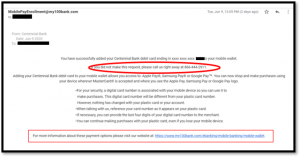
For more information about protecting yourself and your finances, contact your local UF/IFAS Extension Agent.
Extension classes are open to everyone regardless of race, creed, color, religion, age, disability, sex, sexual orientation, marital status, national origin, political opinions or affiliations.

by Julie McMillian | Jun 22, 2020
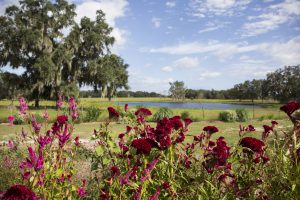
Today’s Climate
Photo Source: UF/IFAS Photo Database
Many confuse the two words climate and weather. Weather is the day to day conditions of our atmosphere. Whereas, climate refers to the average of the weather over time. Weather depicts how we dress day to day and can change often. Climate refers more to the average weather over time. We generally must prepare for our climate by buying appropriate clothing and preparing our home for longer term weather conditions.
What causes the climate to change? There are three important greenhouse gases that have dramatically increased since industrialization: carbon dioxide, nitrous oxide and methane. The increases are primarily due to our changes in land use over time. These factors make our earth’s surface temperature warmer which affects our loss of sea ice and longer fire seasons, and can contribute to extreme weather events.
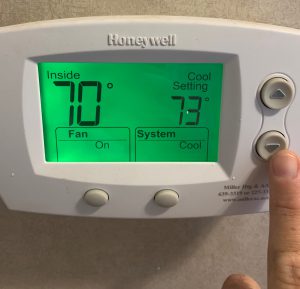
Adjust the temperature
Photo Source: Julie McMillian
The question is, what can I do in my own world and community to help on an individual basis? There are several ways that we can reduce our energy use of electricity at home which will help us to contribute to the bigger picture. Some simple suggestions are when you are not using the television, computer, lights, heating and cooling, try to turn them off or down for a while. Purchasing shades or curtains for your windows can keep your house cooler in the summer and fans may be able to replace the air conditioner on some occasions. When running the air, heat or hot water heater check your thermostat for energy saving features. Try to only run the dishwasher or washing machine with full loads and be sure to clean out your lint trap in the dryer so it has good airflow. You will find you might even save a few dollars by being mindful of your energy consumption.
Next, let’s talk about reducing greenhouse gases in our yards. Composting food scraps is a great way to reduce waste from landfills and turns your waste into reusable soil. Planting trees and plants helps to reduce carbon dioxide in the atmosphere. Plants store carbon and help to regulate temperatures in the home. Another thing to consider is, where does your water run off go? If water can be routed to your garden it is a win-win.
How do we plan our food system in our home? Reducing food waste has many benefits. We can save money, help our community, conserve energy and resources just by rethinking the way we plan our meals. If we buy more unprocessed foods, there will be less packaging. If we are able to grow our own food or just eat at home more, it cuts down on trips to restaurants and stores.
These are just a few ways to get you thinking about climate change in Florida. As a citizen, we can take action by staying informed and showing our support. If we hold ourselves accountable by looking at our personal impact, we may be surprised what we are leaving behind with our footprint. For more information on healthy living or other extension related topics, contact your local UF IFAS county extension office.
Supporting information for this article can be found in the UF/IFAS Extension EDIS publications:
Science Support for Climate Change Adaptation in South Florida
Climate Change Adaptation: New Perspectives for Natural Resources Management and Conservation
Energy Efficient Homes
UF/IFAS Extension is an Equal Opportunity Institution.

by Laurie Osgood | Jun 15, 2020
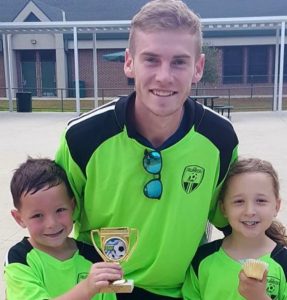
Photo Source: Laurie Osgood
With everything going on in the world today, it could be easy to forget one of the most important holidays of the year, Father’s Day. We will celebrate Father’s Day on June 21st this year, during Men’s Health Month! Father’s Day is a good time to show the men in our lives that we want them to be with us for a long time. Let’s celebrate Men’s Health Month by encouraging the men in our lives to adopt healthy habits and seek regular medical advice.
Most men do not like to go the doctor. A 2014 survey conducted by The Centers for Disease Control (CDC) determined that American men are much less likely to go to the doctor than women. Starting a conversation could encourage him to pay attention to his health as he ages. But how do we start the conversation with our father’s about their health issues? To ensure a stress-free conversation, pick a time and place with few distractions and present the topic in a loving and non-judgmental manner.
Here Are the Top Healthy Living Tips for Men:
- Schedule an annual physical exam: Annual physical exams can help spot potential problems before they get serious. Only you and your doctor can determine your best checkup and screening schedule. Preventative screenings such as an annual colonoscopy are based on a patient’s age and risk factors for developing a condition or disease, including family or personal history, age, ethnicity, and environmental exposure.
- Recognize the Signs and Symptoms of a Heart Attack: According to the American Heart Association, someone in the U.S. has a heart attack every 40 seconds. Therefore it is important for everyone to recognize the signs of a heart attack. These warning signs include pain or discomfort in the jaw, chest, arms, shoulders, neck, or back, feeling light-headed or weak and shortness of breath.
- Make sleep a priority: Many adults don’t get enough sleep. Sleep is essential for our bodies to maintain our healthy bodily functions. Sleep disorders and ongoing lack of sleep can increase the risk of heart disease, high blood pressure, stroke, and diabetes.
- Reduce Stress: High levels of stress can negatively affect a man’s lifestyle. Stress can be life threatening and can lead to a heart attack. UF/IFAS Extension’s Electronic Data Information Source (EDIS) offers a collection of information on various subjects including how to manage stress.
- Stop Smoking: Men who smoke are at a greater risk for heart disease, cancer, respiratory diseases and strokes. Quitting can help lower the risk for smoking-related illnesses. The Florida Department of Health’s Tobacco Free Florida campaign offers resources to help quit tobacco use.
- Exercise More: Regular workouts can improve heart health as well as reduce stress and weight. Experts tell us that we should all try to get at least 30 minutes of moderate physical activity each day to maintain a healthy lifestyle.
- Eat Healthy: A healthy diet should include a variety of fruits and vegetables, whole grains, lean meats, and low-fat dairy products daily. USDA offers tips for Men’s Health; 10 Tips: Get the Facts to Feel and Look Better .
Father’s Day is a great time to celebrate the men in our lives and encourage them to pay attention to their health and well-being because we want them to be around for a long time.
Going to the doctor may not be as fun as going to a ballgame or the beach, but having a conversation about their health may be the gift we can give our fathers on Father’s Day.
For more information on healthy living or other extension related topics, contact your local UF/IFAS Extension Agent.
Extension classes are open to everyone regardless of race, creed, color, religion, age, disability, sex, sexual orientation, marital status, national origin, political opinions or affiliations.

by Dorothy C. Lee | Jun 11, 2020
The classic succulent vegetable of summer is ripe for your salads, sandwiches and salsa. Tomatoes can be used many ways to make good food with good nutrition.

Tomatoes are one of the most popular vegetables among home gardeners. Excellent source of vitamins C and A. (Photo source: UF/IFAS file photo)
Uses & Preparation
Unripe tomatoes take 3 to 4 days to ripen. Use ripe tomatoes within a day or two. For best flavor, do not refrigerate. Slice, wedge or dice; sprinkle with a fresh herb, drizzle with olive oil and serve. Wonderful with slices of avocado, but then skip the olive oil. Stuff with seafood, chicken, or pasta salad. Cherry tomatoes make a delicious, nutritious snack by themselves.
Selection
Ripe tomatoes will give slightly to gentle pressure.
Storage
Store unwashed at room temperature and out of direct sunlight.
Tomato, Zucchini & Onion
2 cups sliced tomato
2 cups sliced zucchini
2 cups sliced onion
1 1/2 teaspoon Italian herb seasoning
1/2 teaspoon salt (optional)
dash of pepper
Preheat oven to 350 degrees. Layer onion, tomato, and zucchini in a 2-quart casserole dish that has been sprayed with a non-stick coating. Sprinkle each layer with seasonings. Bake for 30-45 minutes, depending on how soft you want the vegetables.
Basil Tomatoes
The addition of basil gives an excellent flavor to fresh tomatoes.
2 cups tomatoes, diced or sliced
1 teaspoon dried basil
1 teaspoon chopped garlic
1/2 teaspoon salt (optional)
1/8 teaspoon pepper
Mix ingredient and let sit at room temperature at least 1 hour. Serve plain or on a lettuce leaf.
Nutrition Information
Excellent source of vitamin C. Good source of vitamin A.
Available Fresh
June – July & September – October
To learn about fresh Florida tomatoes, please read our fact sheet: Panhandle Produce Pointers – Tomatoes
For more delicious produce preparation tips, please visit: http://www.panhandleproducepointers.com.
For a quick and easy salsa, please visit: Easy Salsa
UF/IFAS Extension is an Equal Opportunity Institution.














